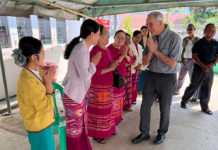An open letter to the board of supervisors
Editor:
I have been listening and watching what is happening in our county, not only during the current emergency but also during the Kincade Fire and now I am ready to speak out. I am ready to put into words the frustration and lack of understanding how “we” cannot figure out how to come together and talk.
With the statement put out by Sheriff Mark Essick I am sad that most people have taken the decision to stand with him or against him, rather than digging deeper and asking “Why did he feel it necessary to go this far and make a public statement opposing the Health Order”.
How many times have (the board of supervisors) been accused of not being transparent? What do you do when someone says that to you? Do you put up your guard and defend yourself, or do you ask the person if they can give you an example of when they have felt like you did that? Do you take the time to understand what is making them have that perspective?
Let me share with you a recent example. There was a meeting with the Economic Development Board and Los Cien recently and many of the Latinx leaders were not at the table. So many are fighting daily to make a difference in their community and are missing out of these important discussions. I need you as leaders of our districts to take the lead and have the county, as a whole, be the ones that ensure communication and invites are made across the spectrum.
The lack of access to information is what leads to the “perception” of not being transparent. This is one of the biggest issues that I have found in my grassroots work in Windsor. The people feel a lack of connection and communication from organizations. If we all have the same ultimate goal, then we should be at the same table listening to each other and walking away understanding why something is being put into action.
I have heard leaders recently say “There has been work that is being done.” To that I say, ”No there has not.” There have been meetings after meetings, task force after task force, year after year. What are the end results? Where is the increase in cohesiveness? Does everyone get access to information equally? Is the population that is impacted negatively with emergencies getting access to information and services equally? When work is done then you see results of that work, which I have not seen when it comes to our most vulnerable populations.
Here is my request for each of you. Each district supervisor – who do you appoint to sit at the table next to you? Wealthy, well-connected, business owners or are you inviting the people on the ground that day-to-day go out and listen to the people struggling the most. Please begin to pay attention to the people you put into positions that are there to serve the people and/or gather information from the community you serve.
I am asking each of you to have the conversation of who your go-to person is in the community when you need information regarding your constitutions of color, your low-income constituents, your Latino constituents and your older population. When you name this person, then find out if each of them knows about each other and their efforts and do they all have access to the same resources. My point being, this is who you need at the table. This is who you need helping create policy. This is who you need at the beginning of an emergency.
Thank you for your time and I hope to see you all soon at the next table.
Rosa Reynoza
Windsor
Civic center concerns
Editor:
At its June 3 meeting, the Windsor Town Council will consider a one-year extension of Phase 2 of its Exclusive Negotiating Agreement with the Robert Green Company (RGC), a luxury hotel developer.
Many Windsor residents may not be aware of the developer’s proposal to transform the town’s current civic center area into a luxury resort complex. The town’s existing library, town hall, police station and school district offices, as well as Huerta Gym, would be demolished to make way for a 4-story, 151-room hotel and 87 investor-owned vacation rental units.
RGC and town officials project that the tax and ground lease revenues generated by the project would fund the development of a new 3-story civic building and police station on the site of the defunct Windsor Fuel Company. The civic building would house the library, town hall and school district offices.
Their pre-pandemic financial analysis was based on the assumption that the average daily hotel rate would reach $579 by 2026/2027, and that the investor-owned units would sell for an average price of $1.4 million and bring in $748 nightly when used as vacation rentals.
Wine tourism was in decline even before the pandemic, and the developer’s formula may no longer work. Most likely, the formula would never have worked for Windsor.
The developer is seeking to capture all of the value of the current civic center area. Public land would be lost to Windsor residents, forever, in return for a fuel tank farm and a developer’s promise of high future revenues. The deeper the council gets into the project, the harder it will be to extricate from it.
This proposal is a far cry from the town’s 2017 vision for the civic center area, which called for a mixed use/boutique hotel on the Huerta Gym site and high-density residential units on the Windsor Fuel site. A new library and town hall were located within the current civic center area. The 2017 vision was integrated into the town’s 2040 General Plan.
Windsor residents who are concerned about the Civic Center project should speak up at the 6 p.m. meeting, or send in their comments beforehand. See the agenda and instructions posted on the Town’s website at https://www.townofwindsor.com/721/Agendas-Minutes-Videos.
Judy Gerstle
Windsor
50.1
F
Healdsburg
April 20, 2025








